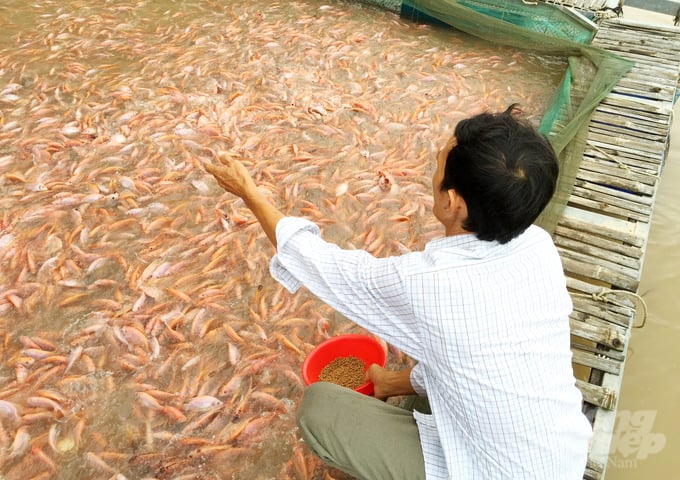November 28, 2025 | 03:45 GMT +7
November 28, 2025 | 03:45 GMT +7
Hotline: 0913.378.918
November 28, 2025 | 03:45 GMT +7
Hotline: 0913.378.918

Since the beginning of the year, An Giang Animal Husbandry and Veterinary Sub-department have deployed 5 rounds of sample collection to monitor diseases in aquatic products. Photo: Le Hoang Vu.
Mr. Tran Tien Hiep, Director of the An Giang Animal Husbandry and Veterinary Sub-department said that, since the beginning of the year, the Sub-department has deployed 5 rounds of sample collection to proactively monitor diseases on aquatic products in 2023, detecting many diseases on farmed aquatic products.
Of the 40 fish samples taken for diseases surveillance in phase 1, 4 pangasius samples in Cho Moi district, Phu Tan were positive for Aeromonas hydrophyla, 2 snakehead fish samples in Chau Phu district were positive for Aeromonas ssp and 5 red tilapia samples in Long Xuyen city, Cho Moi district were positive for Streptococcus spp.
Phase 2 contains a total of 43 samples with 41 fish samples and 2 shrimp samples. Results: 1 pangasius sample in Chau Phu was positive for Edwardsiella ictaluri, 3 snakehead fish samples in Thoai Son, Chau Phu were positive for Pseudomonas spp, 3 samples of red tilapia in Long Xuyen and Cho Moi were positive for Streptococcus spp.
In phase 3, a total of 39 fish samples were taken. As a result, 2 red tilapia samples in Long Xuyen were positive for Streptococcus spp and 2 pangasius samples in Chau Phu district were positive for Edwardsiella ictaluri. Antibiograms are prepared and households are instructed on treatment.
Phase 4 contains a total of 42 samples with 40 fish samples and 2 giant freshwater shrimp samples. As a result, 3 pangasius samples in Long Xuyen and Chau Phu were positive for Aeromonas hydrophyla, 2 pangasius samples in Long Xuyen and An Phu were positive for Edwardsiella ictaluri, 4 snakehead fish samples in Thoai Son, Chau Phu were positive for Pseudomonas spp and 2 red tilapia samples in Long Xuyen were positive for Streptococcus spp.
In Phase 5, a total of 40 fish samples were taken. As a result, 3 pangasius samples in Phu Tan, Chau Phu were positive for Aeromonas hydrophyla, 4 snakehead fish samples in Thoai Son, Chau Phu were positive for Pseudomonas spp, 3 red tilapia samples in Long Xuyen and Cho Moi were positive for Streptococcus spp and 2 red tilapia samples in Cho Moi were positive for Tilapia lake Virus (TiLV).
Translated by Hoang Duy

(VAN) According to Mr. Vo Minh Thanh, Director of the Tay Ninh Department of Agriculture and Environment, Resolution 57 has created a new development pathway for the locality, shifting from traditional toward modern agriculture.
/2025/11/26/4909-2-154329_878.jpg)
(VAN) Pearl grouper farming in HDPE cages not only delivers economic efficiency but also contributes to protecting the environment, creating jobs, and promoting marine-based experiential tourism.

(VAN) The model of making a living under the forest canopy through the agroforestry system in Van Son commune, Bac Ninh province, is expected to generate an annual income of approximately VND 30 million/ha.

(VAN) Many enterprises in Can Tho are harnessing natural energy and reducing greenhouse gas emissions in their production processes, thereby contributing to the promotion of a sustainable green transition.
/2025/11/24/3536-2-112800_176.jpg)
(VAN) Dong Nai now has tens of thousands of hectares of forests certified for sustainable management, and this area will continue to be expanded in the coming period.

(VAN) Vinh Ha hamlet (Dai Xuyen commune, Hanoi) is shifting away from small-scale farming as households adopt bioscurity into their breeder chicken models.

(VAN) Heavy rains make aquatic species more vulnerable to disease. Proactive water management and high-tech systems help farmers prevent outbreaks and protect yields.